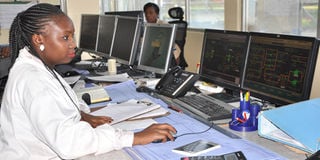How KPC is channelling gender equity across its operations
Sponsored by Kenya Pipeline Company

KPC staff monitoring pipeline operations from the control room.
BY PAULINE ONGAJI
As the world marks International Women’s Day, Kenya Pipeline Company (KPC) proudly celebrates its continued contribution towards achieving gender equality in science.
In fulfilment of the Government’s policy on gender mainstreaming, KPC’s human resource policies provide for the application of principles of affirmative action, through which the company observes gender balance on appointments and promotions, and ensures that a minimum of one-third of either gender are recruited where possible. So far, 27.8 percent of all promotions have been offered to the female gender in the technical fields, on merit.
In addition, KPC has a Gender Mainstreaming Committee, which spearheads activities of gender equity.
The company’s Gender Mainstreaming Policy provides a comprehensive framework of principles and strategies to achieve gender equity and equality, towards creating an enabling environment that is gender responsive and meets specific and distinct needs. It further addresses gender inequalities and champions employees’ rights to equitable employment opportunities and career progression.
Additionally, KPC shares knowledge on gender issues with employees and mobilises resources for activities aimed at promoting gender equity and equality.
In terms of inclusivity, all advertised positions specify that KPC is an equal opportunity employer.
As for its female technical and engineering staff, KPC offers training opportunities locally and internationally. The staff are in addition accorded opportunities to attend Factory Inspection Tests for equipment procured by KPC, prior to installation.
At the same time, female technical and engineering staff are equally considered for promotion opportunities as they arise, and in line with the provisions of the company’s Career Guidelines. It is important to note at this point that KPC produced the first female Certified Oil Pipeline Welder in East and Central Africa from its Morendat Institute of Oil and Gas (MIOG) in 2018. Similarly, to encourage more women to join its engineering and technical cadres, KPC offers industrial attachment opportunities to female students.
As Africa’s premier oil and gas company, the firm set up the KPC Foundation to execute its corporate social investment (CSI) programmes, through which it continues to a make a positive impact on society by improving lives of individuals, special groups, and communities across the country.
The company has committed massive resources to give back to society in appreciation of the communities where its infrastructure, such as the pipeline, passes through, and where other installations, such as pump stations, are located.
KPC has made a deliberate decision to set aside one percent of its profit before tax (PBT) for its corporate social investment activities every financial year. Thematic areas of support include education, health, environment, water and sanitation.
Accordingly, in 2016, KPC initiated the Inuka Programme, which promotes education and skills training of young people with disabilities.
The programme’s objective is to reduce the level of discrimination and stigma amongst people with disability, and enhance their potential, thereby increasing the economic independence among this special group. Half of the programme’s beneficiaries have been girls.
Since its inception in 2016, the programme has benefitted 376 students with disabilities, in the 47 counties. It has been instrumental in helping Kenya to realise one of Vision 2030’s goals of providing equitable access to quality education at all levels, to all social groups. KPC has spent Ksh56 million since the programme was started, translating to Ksh14 million every year.
“As a company, we understand the suffering of people and especially girls with disabilities, in accessing learning and training opportunities. Within the last four years, the company has consistently sponsored 47 students (one from each county) through its flagship scholarship programme (Inuka), to access secondary school education. As at today, we have a total of 188 girls under the special programme,” explains KPC Managing Director, Dr Macharia Irungu.
The maiden class under the programme will be sitting for Kenya Certificate of Secondary Education (KCSE) exams scheduled to begin next month. The company will continue supporting those who will successfully complete their secondary school education until they achieve their dreams.
KPC has also constructed girls’ dormitories, classrooms and libraries, among other amenities, in various girls’ schools. Of particular interest is Karare Secondary School in Marsabit County, where the company constructed a dormitory in an effort to retain girls in school. The company’s employees encourage and mentor these and other girls across the country to take up science, technology, engineering and mathematics (STEM) courses.
KPC does not play this role alone, but collaborates with other Government agencies and NGOs. Examples include partnerships with the National Council of Persons Living with Disability (NCPWD), Institute of Engineers of Kenya (IEK), and various national universities.


